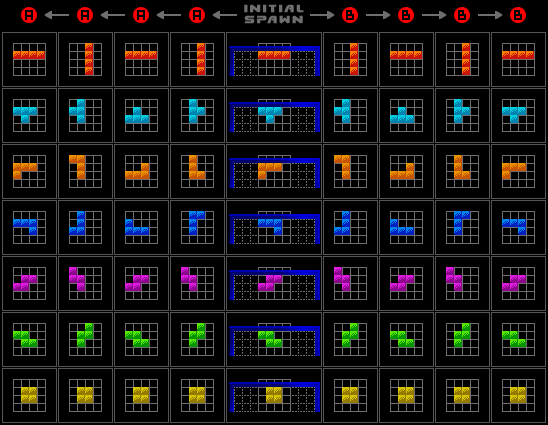Arika Rotation System: Difference between revisions
*>Lardarse I tetromino doesn't kick. Note to self: don't take the wiki as blind fact! :-( |
*>Tepples →Wall kick: clarify |
||
| Line 7: | Line 7: | ||
:''Illustration goes here.'' | :''Illustration goes here.'' | ||
Sometimes a rotation is blocked by the walls outside the playfield or by blocks inside the playfield. Most often, TGM tries to rotate the tetromino within the box without moving it, then | Sometimes a rotation is blocked by the walls outside the playfield or by blocks inside the playfield. Most often, TGM first tries to rotate the tetromino within the box without moving it, then (for J, L, S, T, and Z) tries [[wall kick]]s: one space to the right, then try one space to the left, then fail. In some special cases, TGM skips these displacements. It also won't attempt to kick an I tetromino. TGM2 and Sakura Tetris use the same system as TGM. | ||
{| | {| | ||
Revision as of 16:36, 28 May 2007
TGM rotation is a game play mechanic used in Tetris The Grand Master and other Arika tetromino games, derived from Sega rotation.
Games using TGM rotation generally use Sega colors, IRS, fast DAS, lock delay, and firm drop, and tetrominoes start out with the topmost block on the top row (generally row 20). Tetris The Grand Master Ace uses a hybrid of TGM rules and Guideline rules.

Wall kick
- Illustration goes here.
Sometimes a rotation is blocked by the walls outside the playfield or by blocks inside the playfield. Most often, TGM first tries to rotate the tetromino within the box without moving it, then (for J, L, S, T, and Z) tries wall kicks: one space to the right, then try one space to the left, then fail. In some special cases, TGM skips these displacements. It also won't attempt to kick an I tetromino. TGM2 and Sakura Tetris use the same system as TGM.
|
|
| ||
| If the | |||
TGM3 also tries a floor kick when rotating a T or I tetromino to some orientations.